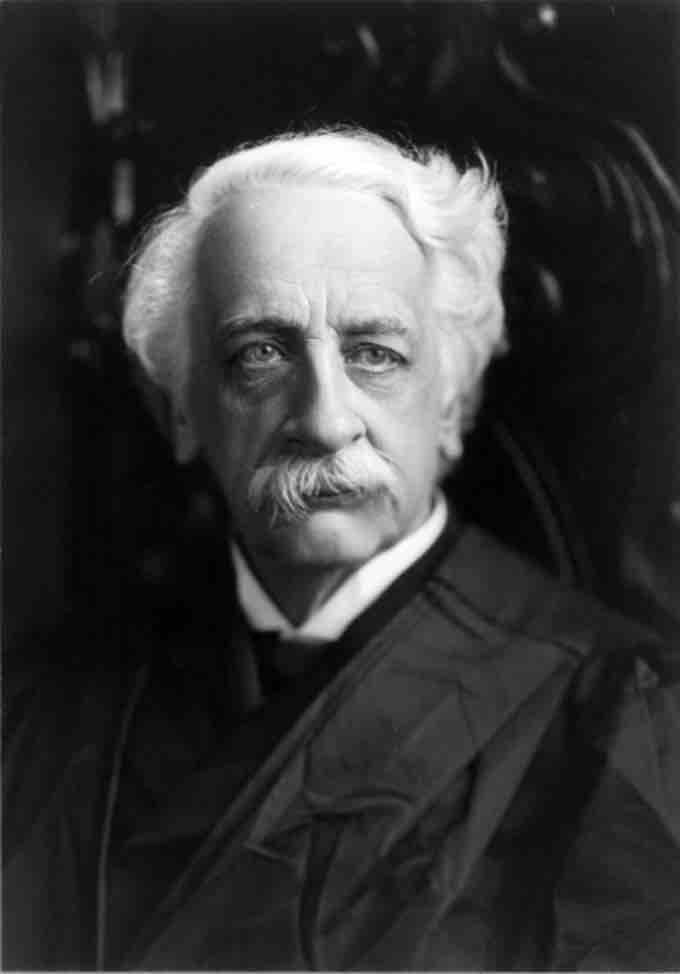Lochner v. New York (1905), was a landmark U.S. Supreme Court case that held that the notion of a "liberty of contract" was implicit in the Due Process Clause of the Fourteenth Amendment. The case involved a New York law called the "Bakeshop Act" that limited the number of hours that a baker could work each day to 10, and limited the number of hours that a baker could work each week to 60.
In 1899, Joseph Lochner, owner of Lochner's Home Bakery in Utica, New York, was indicted on a charge that he violated the Bakeshop Act, in that he wrongfully and unlawfully permitted an employee working for him to work more than 60 hours in one week. Lochner was fined twice for the offense and decided to appeal his second conviction.
Lochner's appeal was based on the Fourteenth Amendment to the Constitution, which provides the following: "... nor shall any State deprive any person of life, liberty, or property, without due process of law." In a series of cases starting with Dred Scott v. Sandford (1857), the Supreme Court established that the Due Process Clause (found in both the Fifth and Fourteenth Amendments) is not merely a procedural guarantee, but also a substantive limitation on the type of control the government may exercise over individuals. Although this interpretation of the Due Process Clause is a controversial one, it had become firmly embedded in American jurisprudence by the end of the nineteenth century. Lochner argued that the right to freely contract was one of the rights encompassed by substantive due process.
By a five to four vote, the Supreme Court rejected the argument that the law was necessary to protect the health of bakers, deciding it was a labor law attempting to regulate the terms of employment, and calling it an, "unreasonable, unnecessary, and arbitrary interference with the right and liberty of the individual to contract." Seven years earlier, the Supreme Court had accepted the argument that the Due Process Clause protected the right to contract in Allgeyer v. Louisiana (1897). Justice Rufus Peckham wrote for the majority, while Justices John Marshall Harlan and Oliver Wendell Holmes, Jr., filed dissents.
Justice Harlan's dissent argued that the Court gave insufficient weight to the state's argument that the law was a valid health measure addressing a legitimate state interest. Justice Holmes's famous dissent criticized the decision for discarding sound constitutional interpretation in favor of personal beliefs. Although it was only three paragraphs long, Holmes's dissent is well remembered and often quoted. In it, Holmes accused the majority of judicial activism, claiming that the case was, "decided upon an economic theory which a large part of the country does not entertain." He also attacked the idea that the Fourteenth Amendment protected the unbridled liberty of contract, writing that, "[t]he Fourteenth Amendment does not enact Mr. Herbert Spencer's Social Statics." This was a reference to a book in which Spencer advocated a strict laissez-faire economic philosophy.
The term "laissez-faire" refers to an economic environment in which transactions between private parties are free from government interference such as regulations, privileges, tariffs, and subsidies. The term is part of a larger French phrase and literally translates to "let (it/them) do," but in this context, usually means to "let go." Laissez-faire, a product of the Enlightenment, was, "conceived as the way to unleash human potential through the restoration of a natural system, a system unhindered by the restrictions of government." In a similar vein, Adam Smith viewed the economy as a natural system and the market as an organic part of that system. Smith saw laissez-faire as a moral program, and the market its instrument to ensure men the rights of natural law. By extension, free markets become a reflection of the natural system of liberty.
Lochner v. New York was one of the most controversial decisions in the Supreme Court's history, giving its name to what is known as the "Lochner Era." During the Lochner Era, the Supreme Court issued several controversial decisions invalidating progressive federal and state statutes that sought to regulate working conditions during the Progressive Era and the Great Depression. Thus, this era could be characterized as laissez-faire. The Lochner era often is considered to have ended with West Coast Hotel Co. v. Parrish (1937), in which the Supreme Court took a much broader view of the government's power to regulate economic activities.

Justice Rufus Wheeler Peckham
Rufus Wheeler Peckham, associate justice of the U.S. Supreme Court (1895–1909), and author of the Court's opinion in Lochner v. New York.